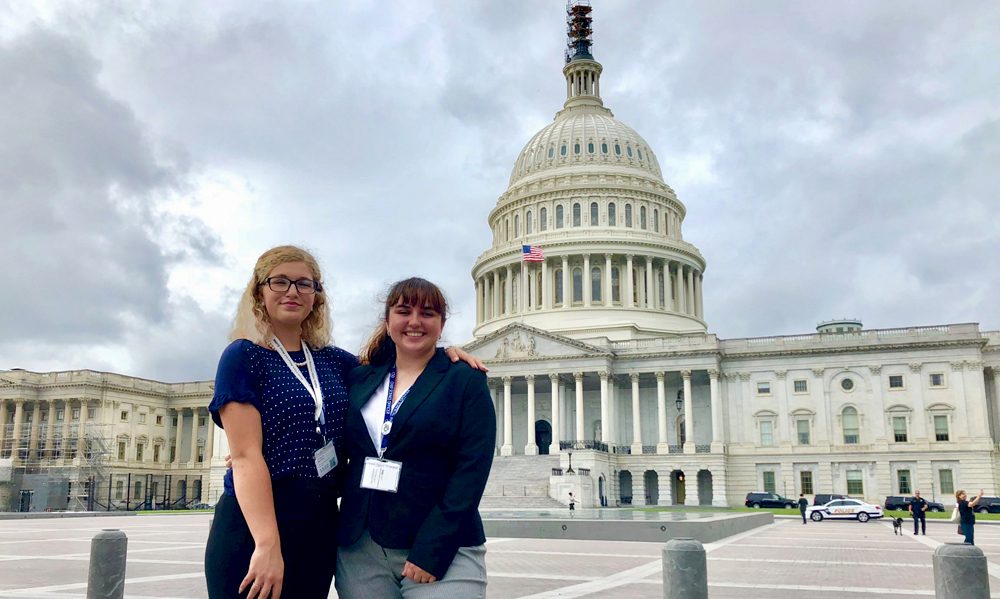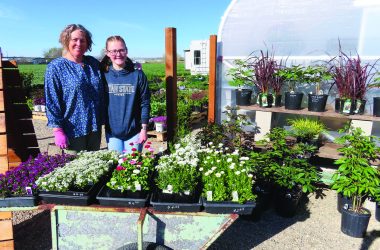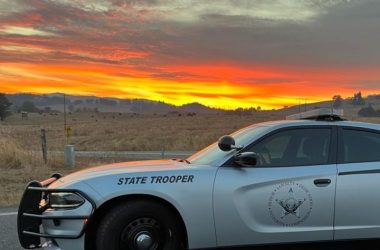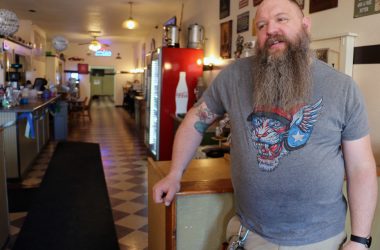 Abi Wachtler (left), a junior at Nyssa High School, and senior Isabel Lastiri from Vale High School were nominated by their peers to representtheir schools in Washington, D.C. , where they advocated for more STEM opportunities. (Submitted photo)
Abi Wachtler (left), a junior at Nyssa High School, and senior Isabel Lastiri from Vale High School were nominated by their peers to representtheir schools in Washington, D.C. , where they advocated for more STEM opportunities. (Submitted photo)
WASHINGTON D.C. — Isabel Lastiri and Abi Wachtler are not your average teenagers. The two are apostles of science, technology, engineering and mathematics.
Last month, Lastiri and Wachtler joined an international group of high school students in Washington, D.C., to advocate for more STEM education opportunities in their schools and communities as part of the chief science officer program.
Students are selected in their school to be science ambassadors who coordinate educational events, field trips and projects.
In Washington, Lastiri and Wachtler and other students met with members of Congrss and visited the Defense Intelligence Agency, NASA, the FBI, and the White House Office of Science and Technology Policy, according to a press release.
“The really cool thing about coming here is that everyone here comes from different backgrounds,” said Lasitri, a senior at Vale High School. “By different background, I don’t mean just gender or race. Everyone has had different experiences.”
Lastiri said her chemistry teacher introduced her to the concept of chief science officers and encouraged her to apply.
She became one of seven science officers at Vale and she was picked to represent the school in Washington.
“It’s really difficult to say what the state of STEM is because Malheur County is the poorest county in the state,” she said. “I’ve heard that only around 14 percent of students go on to graduate from a 4-year college or university when they leave the schools around (Malheur County).”
With a passion for both diversity and social inclusion, Lastiri is determined to knock down doors for herself and rural students like her who are passionate about science.
“I’m hoping to bring back whole new perspectives to my school and community,” she said.
“Being from a small, rural community, I think we have a different perspective. We have a greater understanding of rural America,” she said. “And I feel like we’re often overlooked when it comes to funding and opportunities.”
Wachtler, a junior at Nyssa High School, agrees.
“That’s why we’re here – so we can bring attention to issues in our communities,” she said.
Like Lastiri, Wachtler sees the importance of STEM education.
She said that she joined the science officer program so that she could impact STEM opportunities in her school and the local community.
“Because of our rural location, I think it’s really hard to bring the same STEM opportunities to our communities than bigger city schools,” she said. “I think the resources we get compared to big, urban schools is a lot less. And I think that hinders our programs a little bit.”
She said STEM involves collaboration. She thinks teachers should collaborate more so that students not only learn to make connections between different STEM subjects but also find learning about science and technology practical.
“STEM subjects are usually taught independently from each other. But I think schools should be incorporating those into one subject,” she said. “A lot of people don’t use collaboration enough in the real world. But I think we should teach students about the importance of working together.”
Wachtler and Lastiri have developed action plans for their schools and communities.
“My action plan is to set up a four-day STEM camp for fifth- and sixth- graders to get students really interested in STEM,” said Lastiri. “It’ll be once a week for three to four hours.”
In Wachtler’s case, she wants “to bring back the fishery” that Nyssa once had in the past.
“The fishery would be good to bring back. It was a great hands-on course,” she said. “I could get all the student to work together to bring it back.”
Both said they hope to manifest positive change in their schools.
“I think STEM is really important to teach because we incorporate it in almost everything that we do,” she said. “STEM education is very hands on, and I think hands-on education in the classroom will not only bring excitement and interest but also increase success.”
Reporter Kristine de Leon: [email protected] or 541-473-3377.




